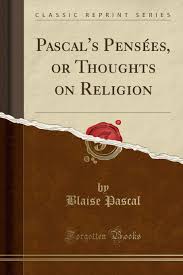Pensées Page #14
The Pensées is a collection of fragments on theology and philosophy written by 17th-century philosopher and mathematician Blaise Pascal. Pascal's religious conversion led him into a life of asceticism, and the Pensées was in many ways his life's work. The Pensées represented Pascal's defense of the Christian religion.
The will is one of the chief factors in belief, not that it creates belief, but because things are true or false according to the aspect in which we look at them. The will, which prefers one aspect to another, turns away the mind from considering the qualities of all that it does not like to see; and thus the mind, moving in accord with the will, stops to consider the aspect which it likes, and so judges by what it sees. 100 Self-love.--The nature of self-love and of this human Ego is to love self only and consider self only. But what will man do? He cannot prevent this object that he loves from being full of faults and wants. He wants to be great, and he sees himself small. He wants to be happy, and he sees himself miserable. He wants to be perfect, and he sees himself full of imperfections. He wants to be the object of love and esteem among men, and he sees that his faults merit only their hatred and contempt. This embarrassment in which he finds himself produces in him the most unrighteous and criminal passion that can be imagined; for he conceives a mortal enmity against that truth which reproves him, and which convinces him of his faults. He would annihilate it, but, unable to destroy it in its essence, he destroys it as far as possible in his own knowledge and in that of others; that is to say, he devotes all his attention to hiding his faults both from others and from himself, and he cannot endure either that others should point them out to him, or that they should see them. Truly it is an evil to be full of faults; but it is a still greater evil to be full of them, and to be unwilling to recognise them, since that is to add the further fault of a voluntary illusion. We do not like others to deceive us; we do not think it fair that they should be held in higher esteem by us than they deserve; it is not then fair that we should deceive them, and should wish them to esteem us more highly than we deserve. Thus, when they discover only the imperfections and vices which we really have, it is plain they do us no wrong, since it is not they who cause them; they rather do us good, since they help us to free ourselves from an evil, namely, the ignorance of these imperfections. We ought not to be angry at their knowing our faults and despising us; it is but right that they should know us for what we are, and should despise us, if we are contemptible. Such are the feelings that would arise in a heart full of equity and justice. What must we say then of our own heart, when we see in it a wholly different disposition? For is it not true that we hate truth and those who tell it us, and that we like them to be deceived in our favour, and prefer to be esteemed by them as being other than what we are in fact? One proof of this makes me shudder. The Catholic religion does not bind us to confess our sins indiscriminately to everybody; it allows them to remain hidden from all other men save one, to whom she bids us reveal the innermost recesses of our heart, and show ourselves as we are. There is only this one man in the world whom she orders us to undeceive, and she binds him to an inviolable secrecy, which makes this knowledge to him as if it were not. Can we imagine anything more charitable and pleasant? And yet the corruption of man is such that he finds even this law harsh; and it is one of the main reasons which has caused a great part of Europe to rebel against the Church.[61] How unjust and unreasonable is the heart of man, which feels it disagreeable to be obliged to do in regard to one man what in some measure it were right to do to all men! For is it right that we should deceive men? There are different degrees in this aversion to truth; but all may perhaps be said to have it in some degree, because it is inseparable from self-love. It is this false delicacy which makes those who are under the necessity of reproving others choose so many windings and middle courses to avoid offence. They must lessen our faults, appear to excuse them, intersperse praises and evidence of love and esteem. Despite all this, the medicine does not cease to be bitter to self-love. It takes as little as it can, always with disgust, and often with a secret spite against those who administer it. Hence it happens that if any have some interest in being loved by us, they are averse to render us a service which they know to be disagreeable. They treat us as we wish to be treated. We hate the truth, and they hide it from us. We desire flattery, and they flatter us. We like to be deceived, and they deceive us. So each degree of good fortune which raises us in the world removes us farther from truth, because we are most afraid of wounding those whose affection is most useful and whose dislike is most dangerous. A prince may be the byword of all Europe, and he alone will know nothing of it. I am not astonished. To tell the truth is useful to those to whom it is spoken, but disadvantageous to those who tell it, because it makes them disliked. Now those who live with princes love their own interests more than that of the prince whom they serve; and so they take care not to confer on him a benefit so as to injure themselves. This evil is no doubt greater and more common among the higher classes; but the lower are not exempt from it, since there is always some advantage in making men love us. Human life is thus only a perpetual illusion; men deceive and flatter each other. No one speaks of us in our presence as he does of us in our absence. Human society is founded on mutual deceit; few friendships would endure if each knew what his friend said of him in his absence, although he then spoke in sincerity and without passion. Man is then only disguise, falsehood, and hypocrisy, both in himself and in regard to others. He does not wish any one to tell him the truth; he avoids telling it to others, and all these dispositions, so removed from justice and reason, have a natural root in his heart. 101 I set it down as a fact that if all men knew what each said of the other, there would not be four friends in the world. This is apparent from the quarrels which arise from the indiscreet tales told from time to time. [I say, further, all men would be ...] 102 Some vices only lay hold of us by means of others, and these, like branches, fall on removal of the trunk. 103 The example of Alexander's chastity[62] has not made so many continent as that of his drunkenness has made intemperate. It is not shameful not to be as virtuous as he, and it seems excusable to be no more vicious. We do not believe ourselves to be exactly sharing in the vices of the vulgar, when we see that we are sharing in those of great men; and yet we do not observe that in these matters they are ordinary men. We hold on to them by the same end by which they hold on to the rabble; for, however exalted they are, they are still united at some point to the lowest of men. They are not suspended in the air, quite removed from our society. No, no; if they are greater than we, it is because their heads are higher; but their feet are as low as ours. They are all on the same level, and rest on the same earth; and by that extremity they are as low as we are, as the meanest folk, as infants, and as the beasts.
Translation
Translate and read this book in other languages:
Select another language:
- - Select -
- 简体中文 (Chinese - Simplified)
- 繁體中文 (Chinese - Traditional)
- Español (Spanish)
- Esperanto (Esperanto)
- 日本語 (Japanese)
- Português (Portuguese)
- Deutsch (German)
- العربية (Arabic)
- Français (French)
- Русский (Russian)
- ಕನ್ನಡ (Kannada)
- 한국어 (Korean)
- עברית (Hebrew)
- Gaeilge (Irish)
- Українська (Ukrainian)
- اردو (Urdu)
- Magyar (Hungarian)
- मानक हिन्दी (Hindi)
- Indonesia (Indonesian)
- Italiano (Italian)
- தமிழ் (Tamil)
- Türkçe (Turkish)
- తెలుగు (Telugu)
- ภาษาไทย (Thai)
- Tiếng Việt (Vietnamese)
- Čeština (Czech)
- Polski (Polish)
- Bahasa Indonesia (Indonesian)
- Românește (Romanian)
- Nederlands (Dutch)
- Ελληνικά (Greek)
- Latinum (Latin)
- Svenska (Swedish)
- Dansk (Danish)
- Suomi (Finnish)
- فارسی (Persian)
- ייִדיש (Yiddish)
- հայերեն (Armenian)
- Norsk (Norwegian)
- English (English)
Citation
Use the citation below to add this book to your bibliography:
Style:MLAChicagoAPA
"Pensées Books." Literature.com. STANDS4 LLC, 2024. Web. 25 Nov. 2024. <https://www.literature.com/book/pens%C3%A9es_114>.




Discuss this Pensées book with the community:
Report Comment
We're doing our best to make sure our content is useful, accurate and safe.
If by any chance you spot an inappropriate comment while navigating through our website please use this form to let us know, and we'll take care of it shortly.
Attachment
You need to be logged in to favorite.
Log In